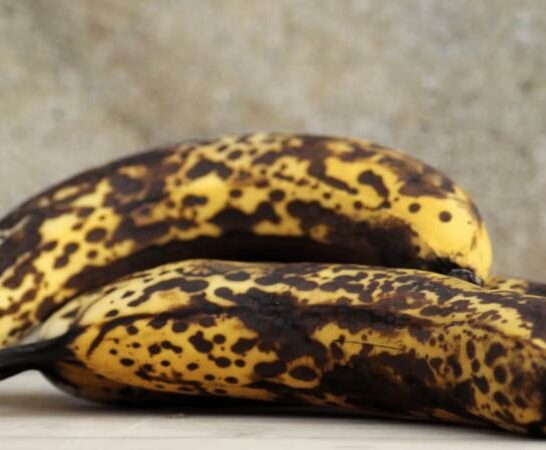Bananas are an excellent source of Vitamin B6, potassium, and fiber, and with all these benefits, it’s easy to see why they’re one of the most popular fruits in the world.
Bananas can last up to two weeks after being picked from the tree if handled properly.
However, many people throw away a banana when they think it is too ripe.
If you’re unsure at what stage a banana becomes too ripe to eat, follow the tips in this article.
Can a Banana Be Too Ripe?
A banana becomes too ripe when it becomes black on the inside, and outside, there is liquid seeping from it, or there is visible mold on the peel. Also, if the banana is entirely mushy to the touch, it has become too ripe.
How to Tell If a Bananas is Too Ripe?
You’ll be looking for a combination of factors to tell if a banana has hit the right spot or if it’s past the point of eating.
The appearance of your banana is an important factor because it can give you a good idea of what stage in ripening it’s at.
If the skin is starting to turn brown, it’s ripe. If there are black spots on the banana, it’s getting close to becoming overripe.
Of course, this will depend on what you use the banana for. If you are just eating it, having a banana that is mostly brown is still good for you.
A black banana is not as great for eating, but it will be great for cooking banana bread.
The feel of your banana is another indicator of ripeness. A ripe banana will be soft but not mushy.
An overripe banana will be very soft and will almost fall apart.
The smell of your banana can tell you a lot about its ripeness, too.
A ripe banana will have a sweet smell, while an overripe banana will have an unpleasant rancid odor.
How Long Do Bananas Take to Ripen?
Typically, bananas will range in the amount of time they take to ripen depending on what color they are when you get them.
The range can be anywhere from 24 hours to five days.
Green bananas are going to take the longest to ripen, while ones that are already turning yellow will be faster.
Bananas, like other fruits, ripen when a chemical called ethylene is released.
The chemical is a natural plant hormone that is gaseous and, when released, causes a breakdown of the plant’s structure and even produces more color and flavor.
You don’t have to wait forever for a banana to ripen on its own, though.
You can easily follow a few simple steps to get your bananas to hurry up so you can eat them faster.
Can You Ripen Bananas Faster?
Ethylene causes bananas to ripen faster, and there are triggers you can add to a banana that will cause more ethylene to be released in a shorter period of time.
One method is to place your bunch of bananas in a warm spot in your home.
Sun is a natural factor in decomposition, and its rays are enough to enact the release of ethylene.
A place where the sun comes in from one of your windows is probably the best place to set your bananas.
It may not seem real, but you can actually speed up the ripening process by putting your bananas next to other fruits that also produce ethylene.
The fruits will absorb this extra ethylene in the air, and it will cause all the fruits to ripen much faster.
Of course, you will want your fruits to be around the same maturity, or else some will ripen faster than others.
Sticking your bananas in the oven is a last resort to ripen them faster.
It’s likely the outside will turn completely black from the heat, but the insides should still be good enough to eat.
Why Do Overripe Bananas Turn Black?
Polyphenol oxidase is the chemical that causes your banana peels to start turning black when they are left at warm temps for too long.
Anything above about 40 degrees will cause the polyphenol oxidase to start releasing.
Whenever the enzyme comes into contact with oxygen, it will cause discoloration.
This doesn’t mean the banana isn’t good to eat, as some bananas will turn black in the fridge but still be perfectly fine to eat inside.
If eating a black banana is just a little too much for you, there is a process you can use to slow the coloring process.
Cover your banana peel in some kind of acid, like lemon juice.
Vinegar will also work well to coat the peel to protect it from oxidizing easily.
Frequently Asked Questions About Can A Banana Be Too Ripe
Is it safe to eat overripe bananas?
An overripe banana is completely safe to eat despite its appearance. Brown spots or even black spots on the peel do not indicate a rotten banana and even if there are black spots beneath the peel you can cut the pieces away and still eat the banana. Overripe bananas actually contain more vitamin C and antioxidant levels.
When should you throw out bananas?
You can safely throw away a banana if it has become too mushy to hold, there is liquid leaking out, or the inside has turned black. Usually, this process happens after about 7-10 days if the banana is left at room temperature.
Conclusion Can A Banana Be Too Ripe
You can have a banana that is too ripe and is not good to eat anymore, but there will be some pretty obvious signs you can look for.
Many people think a banana is too ripe, but some overripe bananas actually contain more nutrients for the body than less ripe ones.

